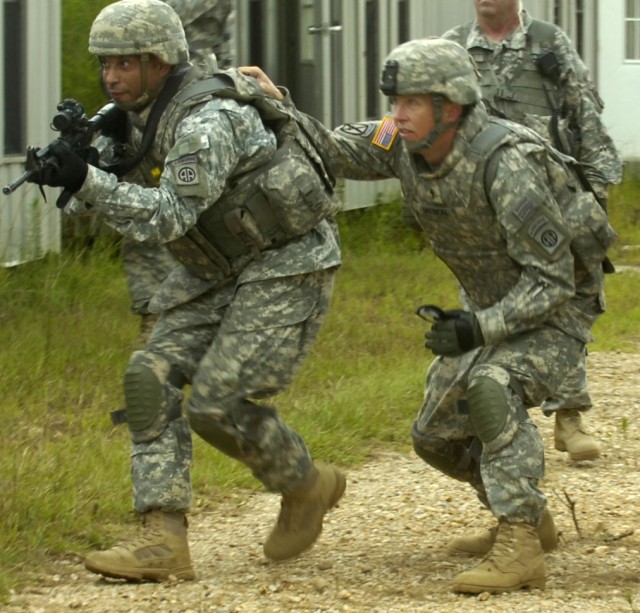
KANDAHAR AIRFIELD, Afghanistan -- For the past 100 years Army chaplain assistants have been protecting and teaming up with chaplains to provide religious support for Soldiers and families across the full spectrum of military operations.
"I didn't know they existed in the Army. The recruiter brought it to my attention," reminisced Sgt. Esteban Ayala Ramirez, a chaplain assistant for the 4th Engineer Battalion.
According to Ayala, his recruiter recommended the chaplain assistant military occupation specialty after learning that he enjoyed bible study and church events in his hometown of San Antonio, Texas.
"He asked me if I wanted to be a chaplain assistant," said Ayala. "He told me the basics; set up religious services, give administrative support, and protect the chaplain."
Ayala has been a chaplain assistant for seven years. He joined the Army September 2003 and presently is on his first tour in Afghanistan after two tours in Iraq.
"After basic training, I went on to advanced individual training in Fort Jackson where I learned to be a chaplain assistant," said Ayala. "Nine months later I was on my first deployment to Iraq, where I experienced what it was like to be a chaplain assistant."
Ayala's first experience as a chaplain assistant was in a combat zone, where he realized that he really enjoyed his job.
"Outside the wire I call the shots, I'm the boss and the protector," said Ayala. "It's your call when you start getting hit. You learn the battle drills and standard operating procedures of the Soldiers you are with and protect your chaplain. It's their lives in your hands and it's your responsibility to protect them."
Chaplain assistants aren't just bodyguards, but are also assistants to the chaplain. While on his first deployment, Soldiers would approach and ask Ayala, who was a private at the time, to give them an encouraging words.
"It was really tough. We would have incoming [rounds] and it was common to come under attack," according to Ayala. "We would get in a circle and pray at convoy briefings; pray for the mission, protection of the Soldiers, for God to give them swift victory on the road and thy will be done."
According to Ayala a chaplain assistant's job is to honor the dead, care for the wounded and nurture the living.
"My job is to always be there for Soldiers that need an encouraging word and assist the chaplain to bring a strong and effective ministry to the unit," said Ayala, "and in this joint task force, to help any servicemember with guidance and prayer."
Part of Ayala's job is to pre-counsel Soldier's and help them with personal problems by directing them to the appropriate subject matter experts such as the chaplain, psychologist, combat stress team or even on the phone with a counselor back in the U.S.
"We have taken some losses and it's brought the morale down somewhat but that is always the case." said Ayala. "By talking to the Soldiers, praying and being there for them we try to get them past it."
According to Ayala, to be a successful chaplain assistant you must be willing to sacrifice your personal time and get to know as much as you can about your Soldiers and the problems they face.
"You have to be a people person for this job," said Ayala. "I always tell my Soldiers in the line company to feel free to come to the chaplain's office. You don't have to make an appointment and the door is always open."

Social Sharing